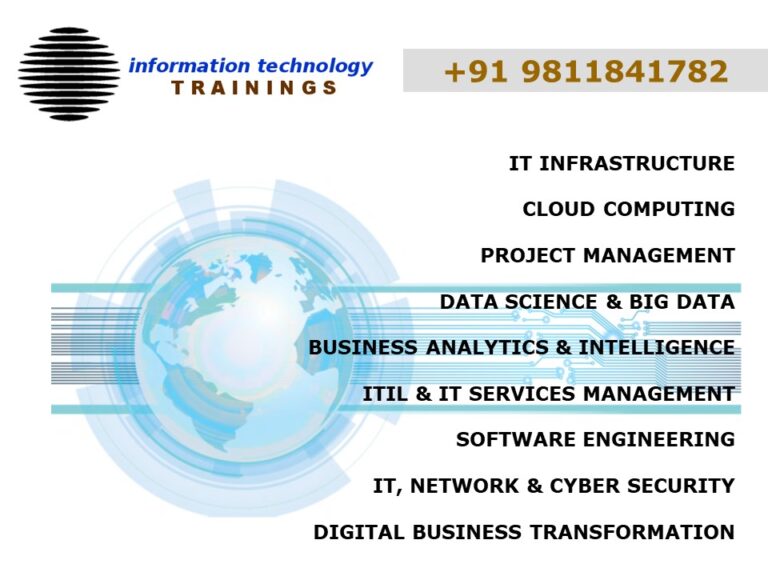DURATION : 5 DAYS – JANUARY 2023
LIVE ONLINE / OFFLINE MODE
WHO SHOULD ATTEND
Anybody who is responsible for these sets of activities: Process Modeling, Process Analysis, Process Design, Process Change and Transformation, Process Implementation, Process Monitoring and Control, and Process Performance Improvement. Some of these roles may be staffed in IT organizations and some in other business disciplines.
Business Process Management (BPM) enables the design, analysis, optimization, and automation of business processes. It does this by separating process logic from the applications that run them; managing relationships among process participants; integrating internal and external process resources; and monitoring process performance. Businesses need to constantly adapt their processes, yet they are often held back by static IT systems that aren’t designed to exploit future opportunities.
Business process management is a new change management and systems implementation methodology that overcomes this problem. In the current economic climate the need is greater than ever for organizations to implement and execute problem solving & cost cutting programs, continuous improvement programs and business legislation & standards programs. These business processes must be easy to rollout across the enterprise and allow the company to easily carry out data collection, regular interventions, inspections and audits.
Business Process Management
The Business Process Management module focuses on the concepts of BPM, such as key definitions, end‐to‐end process, customer value, and the nature of cross functional work. Process types, process components, the BPM lifecycle, along with critical skills and success factors are introduced and explored. This module defines BPM and provides the foundation for exploring the Core Areas of BPM.
Process Modeling
Process Modeling includes a critical set of skills and processes that enable people to understand, communicate, measure, and manage the primary components of business processes. The Process Modeling Core Area provides an overview of these skills, activities, and key definitions, along with an understanding of the purpose and benefits of process modeling, a discussion of the types and uses of process models, and the tools, techniques, and modeling standards.
Process Analysis
Process Analysis involves an understanding of business processes, including the efficiency and effectiveness of business processes. This module explores process analysis purpose, activities to support process decomposition, and analytical techniques along with roles, scope, business context, rules, and performance metrics. The focus is on understanding current‐state processes with a view to achieving improvement in the future state. A variety of process analysis types, tools, and techniques are included within this Knowledge Area.
Process Design
Process design involves creating the specifications for business processes within the context of business goals and process performance objectives. It provides the plans and guidelines for how work flows, how rules are applied, and how business applications, technology platforms, data resources, financial, and operational controls interact with other internal and external processes. Process design is the intentional and thoughtful planning for how business processes function and are measured, governed, and managed. This Core Area explores process design roles, techniques, and principles of good design, along with an exploration of common process‐design patterns and considerations such as compliance, executive leadership, and strategic alignment.
Process Performance Measurement
Process performance measurement is the formal, planned monitoring of process execution and the tracking of results to determine the effectiveness and efficiency of the process. This information is used to make decisions for improving or retiring existing processes and/or introducing new processes in order to meet the strategic objectives of the organization. Topics covered include importance and benefits of performance measurement, key process performance definitions, monitoring and controlling operations, alignment of business process and enterprise performance, what to measure, measurement methods, modeling and simulation, decision support for process owners and managers, and considerations for success.
Process Transformation
Process transformation addresses process change. Process changes are discussed in the context of a process lifecycle from planning to implementation. Various process improvement, redesign, and reengineering methodologies are explored, along with the tasks associated with ‘construction,’ quality control, and the introduction and evaluation of new processes. The topic of organizational change management, which is critical to successful process transformation, is also discussed here: it includes the psychological background of change management and success factors for change.
Process Management Organization
The process management organization knowledge area addresses the roles, responsibilities, and reporting structure to support process‐driven organizations. A discussion of what defines a process‐driven enterprise, along with cultural considerations and cross‐functional, team‐based performance is provided. The importance of business process governance is explored, along with a variety of governance structures and the notion of a BPM Center of Excellence (COE) or Competency Center.
Enterprise Process Management
Enterprise process management is driven by the need to maximize the results of business processes consistent with well‐defined business strategies and functional goals based on these strategies. Process portfolio management ensures that the process portfolio supports corporate or business‐unit strategies and provides a method to manage and evaluate initiatives. The Enterprise Process Management Knowledge Area identifies tools and methods to assess process management maturity levels, along with required BPM practice areas that can improve a BPM organization state. Several Business Process Frameworks are discussed, along with the notion of process integration—i.e., interaction of various processes with each other and with models that tie performance, goals, technologies, people, and controls (both financial and operational) to business strategy and performance objectives. The topics of process architecture and best practices in enterprise process management are explored.
BPM Technology
BPM is a technology‐enabled and supported management discipline. This module discusses the wide range of technologies available to support the planning, design, analysis, operation, and monitoring of business processes. These technologies include the set of application packages, development tools, infrastructure technologies, and data and information stores that provide support to BPM professionals and workers in BPM‐related activities. Integrated Business Process Management Suites (BPMS), process repositories, and stand‐alone tools for modeling, analysis, design, execution and monitoring are discussed. BPM standards, methodologies, and emerging trends are also covered.
FOR MORE INFORMATION & REGISTRATION : Write to Us
mail@institute-of-it-trainings.com
+91 9811841782




